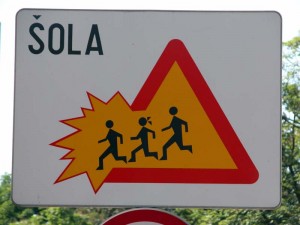 School starts at 9:00 AM and goes until 12:30 with a half hour brake in the middle. I am in the first level class, i.e. the class for those who have absolutely no previous exposure to the language. Our teacher is Marjana Lavrič, a very pleasant woman who very much appears to enjoy what she is doing. She has a way of adding a lot of energy into the class and I am looking forward to the weeks to come even more now. The class is composed of eleven students with varying knowledge of foreign languages.
School starts at 9:00 AM and goes until 12:30 with a half hour brake in the middle. I am in the first level class, i.e. the class for those who have absolutely no previous exposure to the language. Our teacher is Marjana Lavrič, a very pleasant woman who very much appears to enjoy what she is doing. She has a way of adding a lot of energy into the class and I am looking forward to the weeks to come even more now. The class is composed of eleven students with varying knowledge of foreign languages.
Although we are all starting off in the same boat, it is clear that there are varying comfort levels in the class. Those who know at least one foreign language or have at least studied a foreign language seriously seem to have a major advantage. Those who have not appear to struggle immediately. It is an interesting and very sad commentary on the American education system that the majority of those having problems in the class are Americans. Some students, although they may be putting the most effort into the class are also the ones having the hardest time.
The class is an balance of vocabulary, grammar and conversation. Slovene is basically an inflected language, meaning that there are lots of “endings” to words, word order is a little more relaxed, and in translation many English words (such as the subject of a sentence) are implied.
One interesting peculiarity of Slovene is the existence of a “dual” number. In most languages one has singular and plural forms of words (man – men, cup – cups, octopus – octopi) Slovene has and additional form for when you are speaking of precisely two of something. (This is a form that has dropped out of almost every other language today. It is an extremely rare.) For this reason Slovene is sometimes described as a “language or intimacy” since there is a whole different construction for saying we, i.e. “you and I” do something as opposed to we, “all of us” do something. One can readily see that this naturally lends itself to certain poetry and prose (especially love poetry and romantic prose) that cannot be easily or accurately translated into another language.
